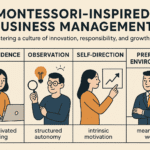
The advancement of technology in the Digital Era has given rise to various tools and software that aim to simplify tasks.
Artificial intelligence (AI) has become a hot topic of discussion, with tools like DALL-E and ChatGPT generating excitement and raising concerns about its potential drawbacks.
However, it is important to approach the subject with caution and consider both the positive and negative aspects of AI.
Undoubtedly, AI has proven to be a valuable technology that allows people to work more efficiently.
In this report, we will explore five ways in which AI can be advantageous.
Whether you want to improve time management, reduce your workload, or automate tedious tasks, this report will provide valuable insights.
Let’s begin by defining AI and discussing its evolution in the workplace.
AI is created through the development of algorithms that enable machines to perform specific tasks, particularly those that are considered trivial or tedious for humans.
Virtual assistants like Siri and Alexa rely on AI technology to schedule appointments and set reminders.
This not only saves time but also simplifies these mundane tasks.
Intelligent Task Automation
One of the key benefits of AI is intelligent task automation.
It can simplify complex tasks by removing complicating factors, allowing human operators to focus on simpler and necessary aspects.
For example, AI can write and send emails on behalf of busy professionals, freeing up their time for other important tasks.
Additionally, AI tools can organize cluttered inboxes by categorizing emails based on priority, ensuring efficient management.
Industries such as manufacturing, finance, and customer service have greatly benefited from AI.
For instance, manufacturing companies have employed robots powered by AI to perform assembly tasks, resulting in improved efficiency.
In the financial industry, AI has automated data analysis, enabling faster and more accurate decision-making.
Furthermore, AI has proven to be effective in preventing fraud and protecting customer accounts.
Enhanced Decision Making
AI also enhances decision-making processes by analyzing large datasets and uncovering trends and patterns that may be missed by humans.
This is particularly valuable in the healthcare industry, where AI algorithms can analyze patient data and assist doctors in diagnosing diseases with greater accuracy.
It ensures personalized treatment plans that are effective from start to finish, prioritizing the health and well-being of patients.
While concerns about potential misdiagnoses or harm caused by AI exist, it is important to consider the benefits it brings to the healthcare industry.
Overall, AI has revolutionized various sectors, streamlining tasks, improving decision-making, and enhancing productivity.
However, it is crucial to approach AI implementation with careful consideration and address any ethical concerns that may arise.
AI technology plays a crucial role in healthcare by ensuring accurate and reliable performance of tasks, ultimately leading to safe and effective treatments for patients.
Personalized Learning & Skill Development
In addition to its automation and data analysis capabilities, AI has made significant advancements in personalized learning and skill development.
AI-powered learning platforms cater to individual needs and optimize content based on the learner’s specific path.
These platforms allow learners to progress at their own pace, while also identifying strengths and weaknesses and providing tailored content, quizzes, and assessments to improve in areas of weakness.
This personalized approach not only enhances the learning experience but also facilitates faster skill acquisition and practice.
The benefits of AI in education and professional development extend beyond work training.
It can also be applied to personal skill development, such as language learning.
AI tools like chatbots engage in conversations with students to enhance their reading, speaking, and comprehension skills.
The difficulty level of lessons can be automatically adjusted to challenge learners appropriately, ensuring continuous growth.
Collaboration Using AI
Another area where AI excels is in collaborative teamwork. AI-based tools streamline communication, project management, and knowledge sharing.
These tools assist in creating virtual team members, retrieving information, making decisions, and coordinating various aspects of a project.
By optimizing task allocation based on skills and competencies, AI reduces communication barriers and enhances team efficiency.
Virtual assistants powered by AI play a crucial role in scheduling meetings, managing project timelines, and providing real-time updates, allowing team members to focus on their core responsibilities and maximize productivity.
AI has proven its ability to improve teamwork effectiveness and increase productivity levels.
Both large enterprises and startups have experienced greater agility and responsiveness to market demands with the help of AI.
AI-Driven Insights for Strategic Planning: The Role of Artificial Intelligence (AI) in Strategic Decision Making
Strategic planning is a crucial aspect of organizational success, and AI is set to revolutionize this process.
By analyzing data and identifying patterns, AI can provide invaluable insights that empower decision makers to make strategic choices.
This technology can examine market trends, customer behavior, and other relevant data sets, enabling businesses to stay ahead of the competition.
Across various sectors, AI is being utilized to deliver accurate and reliable information, supporting effective strategic planning.
Moreover, AI algorithms can also aid in analyzing buyer patterns, making inventory management more streamlined and efficient.
In industries like healthcare, where strategic planning is essential, AI helps forecast patient demand and allocate resources effectively, ultimately ensuring the delivery of optimal services.
However, there are challenges that must be acknowledged and addressed when incorporating AI into strategic planning and decision-making processes.
These include concerns related to data privacy, ethical considerations, and the need for skilled professionals who can interpret AI recommendations.
Transparent communication and responsible AI governance are crucial in overcoming these obstacles and ensuring a positive reception to AI integration.
Ethical dimensions of AI, such as algorithmic bias and responsible use of technology in decision-making, must be carefully addressed.
Implementing ethical guidelines, ensuring transparency, and conducting regular audits can mitigate risks associated with AI integration.
To prioritize responsible AI use, organizations must establish strategies that involve training employees in ethical AI usage, implementing data governance policies, and utilizing AI for collaborative and ethical purposes.
Additionally, accuracy and reliability are vital, particularly when making critical business decisions or determining healthcare treatment plans.
The more accurate and reliable AI becomes, the greater the trust it will inspire, avoiding potential doubts about its trustworthiness in the future.
AI’s Impact on Work: Enhancing Efficiency and productivity
The saying “work smarter, not harder” aptly applies to AI’s role in the workplace.
While discussions surrounding AI technology have been ongoing, it has now reached a stage where it is integrated into everyday tools.
This widespread adoption has been praised by users, but also met with criticism and skepticism.
Concerns regarding job displacement persist, although it remains uncertain whether AI will fully replace human roles.
Nevertheless, AI excels at automating simple tasks and simplifying complex ones.
Rather than acting as a superior entity, AI serves more as an assistant, supporting human decision making.
AI has proven instrumental in automating mundane tasks and streamlining complex processes.
Looking ahead, the future of AI appears promising, and its capabilities will undoubtedly evolve over the next decade.
Currently, the potential for using AI to enhance productivity has never been greater.
















